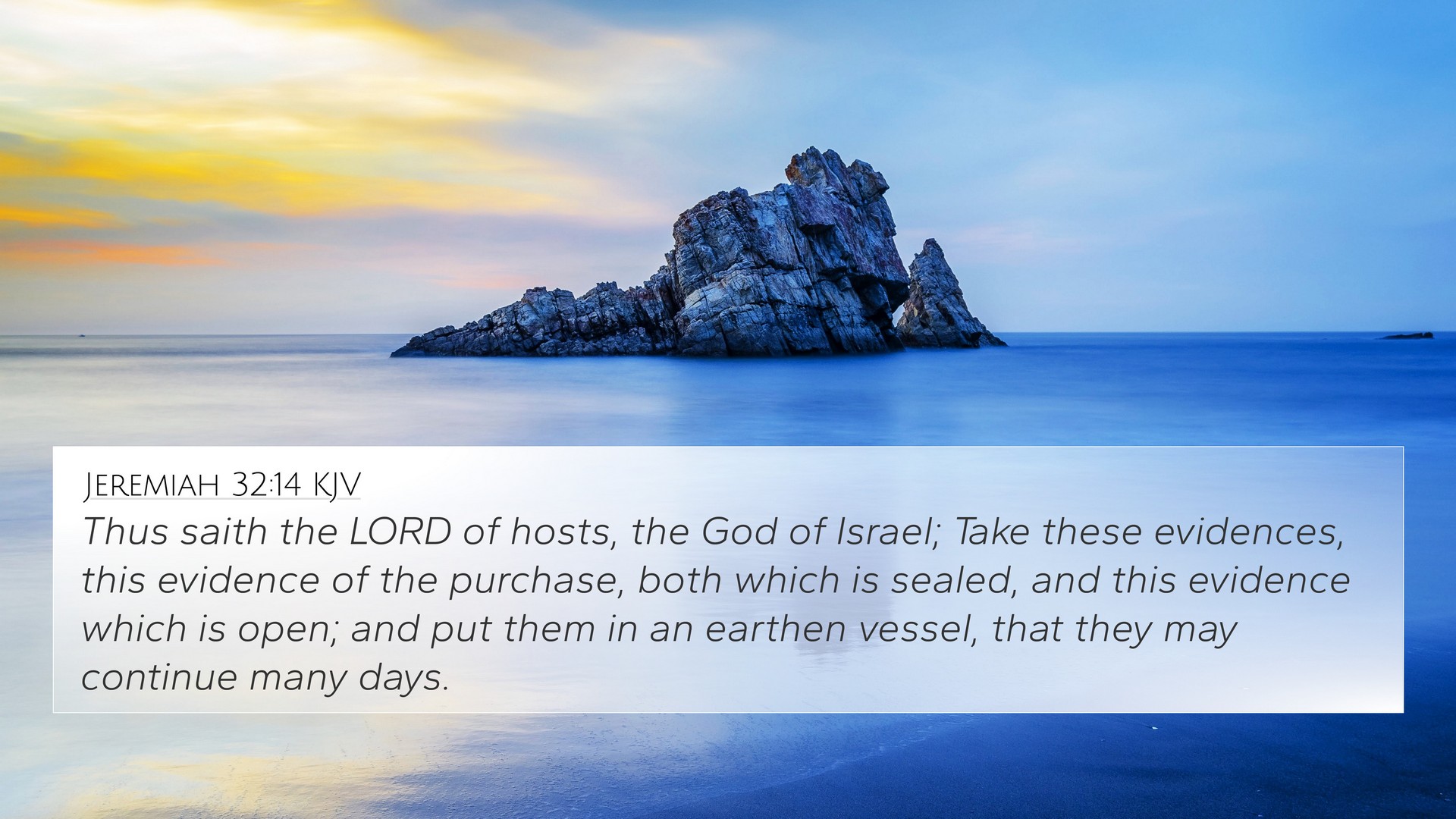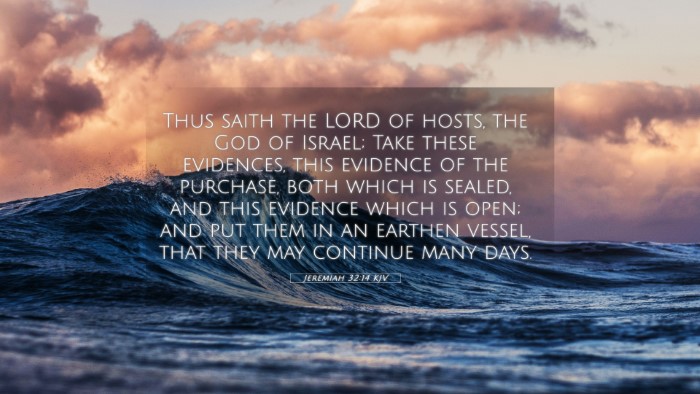Understanding Jeremiah 32:14
Jeremiah 32:14 reads, "Thus saith the Lord of hosts, the God of Israel; Take these evidences, this evidence of the purchase, both which is sealed and this evidence which is open; and put them in an earthen vessel, that they may continue many days." This verse occurs within a poignant narrative in which the prophet Jeremiah, despite a tumultuous period of impending exile for Israel, performs an act of hope by purchasing a field. This act signifies the restoration and future of Israel.
Summary of Insights from Public Domain Commentaries
The insights from Matthew Henry, Albert Barnes, and Adam Clarke collectively illuminate the import of this verse and its implications:
- Matthew Henry:
Henry emphasizes the significance of Jeremiah's act of purchasing the field as a sign of faith in God’s promise. Despite the dire circumstances, Jeremiah's obedience illustrates the importance of acting on God’s word and believing in His future plans for His people.
- Albert Barnes:
Barnes draws attention to the practical elements of the transaction, highlighting the sealing of the deed and its placement in an earthen vessel. This illustrates the care taken to ensure the preservation of the evidence of the land purchase, symbolizing God's promises that will endure through time and despite current trials.
- Adam Clarke:
Clarke notes the wisdom in Jeremiah’s act, framing it as a prophetic gesture that foreshadows the eventual return of the exiles to their homeland. He highlights the symbolic nature of the purchase in context with God’s covenant promise of land to Israel's descendants.
Bible Verse Parallels and Cross-References
Jeremiah 32:14 can be cross-referenced with several other Bible verses that illuminate its themes. Here are some related verses:
- Isaiah 43:1-2: Affirms God’s promise to Israel, reassuring them of His continued protection and presence during crises.
- Ezekiel 36:24-28: Speaks of God’s intent to gather Israel from among the nations and place them in their own land, resonating with the hope expressed in Jeremiah's purchase.
- Hebrews 11:1: Relates to faith in things hoped for, as seen in Jeremiah's actions of faith despite the present circumstances.
- Matthew 6:19-21: Highlights the importance of treasures in heaven over earthly possessions, contrasting Jeremiah's earthly investment with eternal promises.
- Romans 8:28: Reminds believers that all things work together for good to those who love God, echoing Jeremiah's faith in God's ultimate plan for Israel.
- Psalms 37:9: Promise that those who wait on the Lord shall inherit the earth, aligning with Jeremiah's investment in the land.
- 2 Corinthians 5:7: Emphasizes living by faith, which Jeremiah exemplified by trusting in God’s future promises.
- Joshua 1:6-9: Encouragement to be strong and courageous as they would inherit the land, much like Jeremiah’s confidence in God's promises during a time of uncertainty.
- Micah 2:12-13: Points towards the restoration of Israel, emphasizing the hope of reintegration into their land, which Jeremiah acts upon.
- Revelation 21:3-4: Final hopes of restoration and God dwelling with His people, connecting the temporal act of purchasing land to eternal hope in God’s plans.
Conclusion
In summary, Jeremiah 32:14 serves not just as a historical account but as a significant aspect of faith, hope, and the promise of restoration. By cross-referencing this with various scriptures, we can better understand the interconnectedness of Biblical texts that discuss themes of faith in God's promises, enduring hope amidst trials, and the assurance of God's covenant love for His people. Utilizing tools for Bible cross-referencing such as concordances and registration resources can enhance one’s understanding of these themes and how different scriptures relate to and enrich the interpretation of each other.
Learning More about Cross-Referencing in the Bible
For those interested in deepening their study of the Bible, exploring connections between verses can yield rich insights. Here are some methodologies and tools that can aid in this understanding:
- Bible Concordance: A book or digital resource that lists Biblical words, giving verses that contain them, thus aiding in cross-referencing.
- Bible Cross-Reference Guide: Guides that help identify thematic connections between verses across the Old and New Testaments.
- Cross-Reference Bible Study: Engaging in study methods that focus on how different scriptures relate and support one another.
- Comprehensive Bible Cross-Reference Materials: Texts or digital resources designed to provide extensive linking between various scriptures.


